Which Generation Practices the Safest Sex?
Based on our survey of Americans across different generations, Gen Z has the safest sex in America, while Gen X has the riskiest.

Each generation has its own habits, including sexual ones. Different factors may play into why sex habits change from one generation to the next. The way we socialize or our lack of socialization may be creating less interest in sex for younger generations.
Some consider our current times a “sexual recession,” referring to Generation Z’s lack of interest in intercourse and sexual activity. At Innerbody, we decided to look at the research to see what’s going on. Gen Z is currently anywhere from 9 to 25 years old (born between 1997 and 2012). They’re an incredible generation full of knowledge and open minds.
Some of that knowledge has not been obtained by choice, since they’re constantly bombarded with information. Still, it may be their knowledge and perpetual connectivity to information that’s creating a “safer sex” generation. If you’ve spent any time with a Gen Zer, you’re well aware of how they spend a large amount of their time on screens. Video games, social media, and video-based apps are a new way of socializing.
According to the LA Times, Gen Z spends half of their waking hours watching videos on their devices. So, what’s that have to do with safe sex? A lot. Keep reading to see what our survey of more than 1,000 sexually active people revealed about the sex habits among generations.
Jump to:
Key takeaways
- Gen Zers are most likely to have contracted an STD but are also the most satisfied with their sex life.
- More than 1 in 4 Gen Zers prefer masturbation over having sex.
- More than one-third of Gen Zers are satisfied with nonhormonal birth control methods.
How well do you take care of yourself?
From where does Gen Z’s drive for safer sex stem? Are they more aware of self-care and health and possibly the first generation to see how all of that connects? We think so.
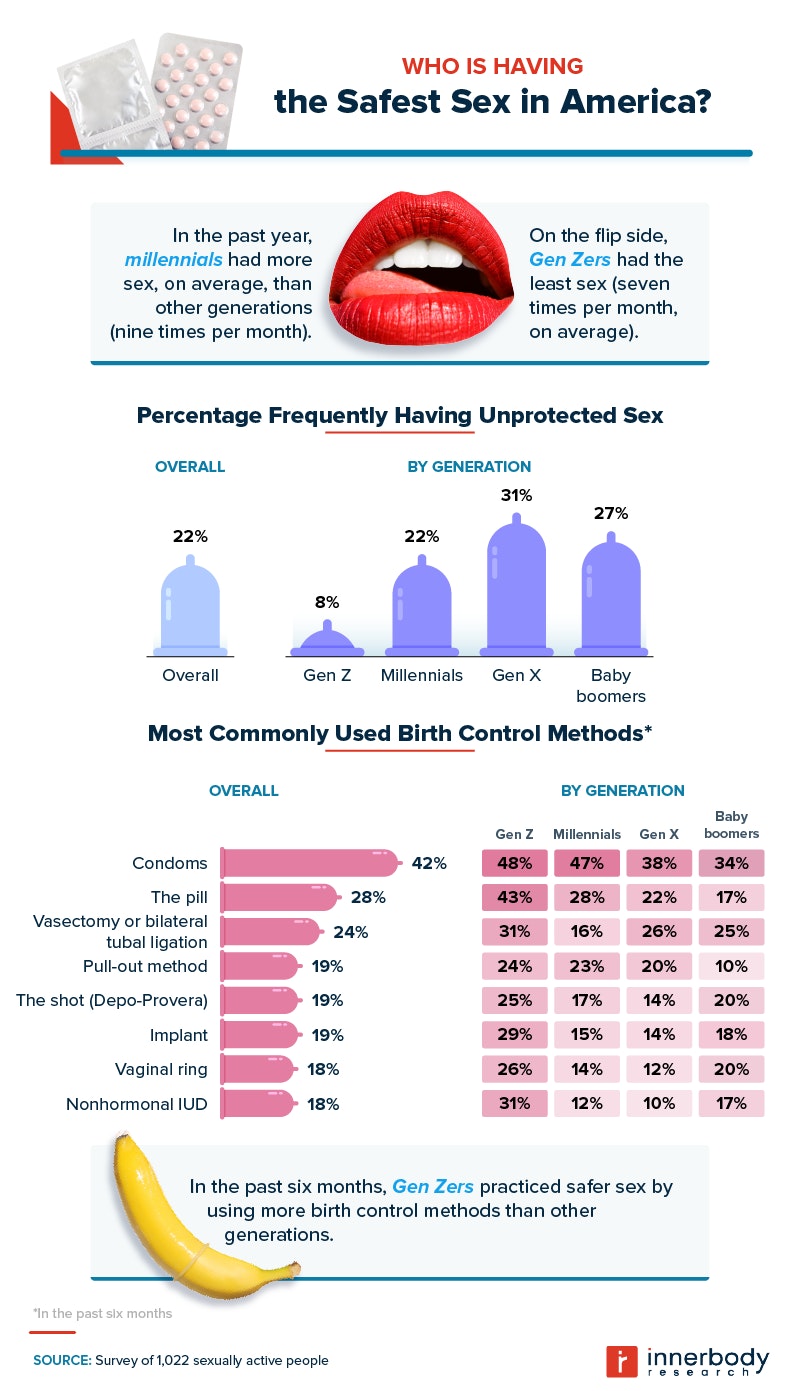
Photo by Innerbody Research
Safe sex is a form of healthy living. When the right protection is used, there is a better chance of preventing contraction of an STD. According to a recent study, “Gen Z seems to have gotten the message a little more strongly than millennials that safer sex is an important part of health.” Parents of Gen Zers have sometimes worried about information overload for their children, but as it turns out, the copious amount of information can lead to increased knowledge. Gen Z is more likely than millenials to practice safe sex. As a matter of fact, they seek safe sex birth control methods more than any other generation surveyed.
All in all, the total percentage of Americans having unprotected sex was a bit shocking at 78%. Those who were single (71%) had the least, followed by married couples (77%) and those in a relationship but unmarried (82%). What does this tell us? Well, Americans have a ways to go before they’re fully protected, but Gen Z is leading the way on changing those numbers for the better.
Are safe sex efforts working, though?
Is the increased availability of birth control actually working? Gen Z, although less sexually active and more likely to use birth control, still had the highest rate of having contracted an STD. Perhaps surprisingly, baby boomers were next in line.
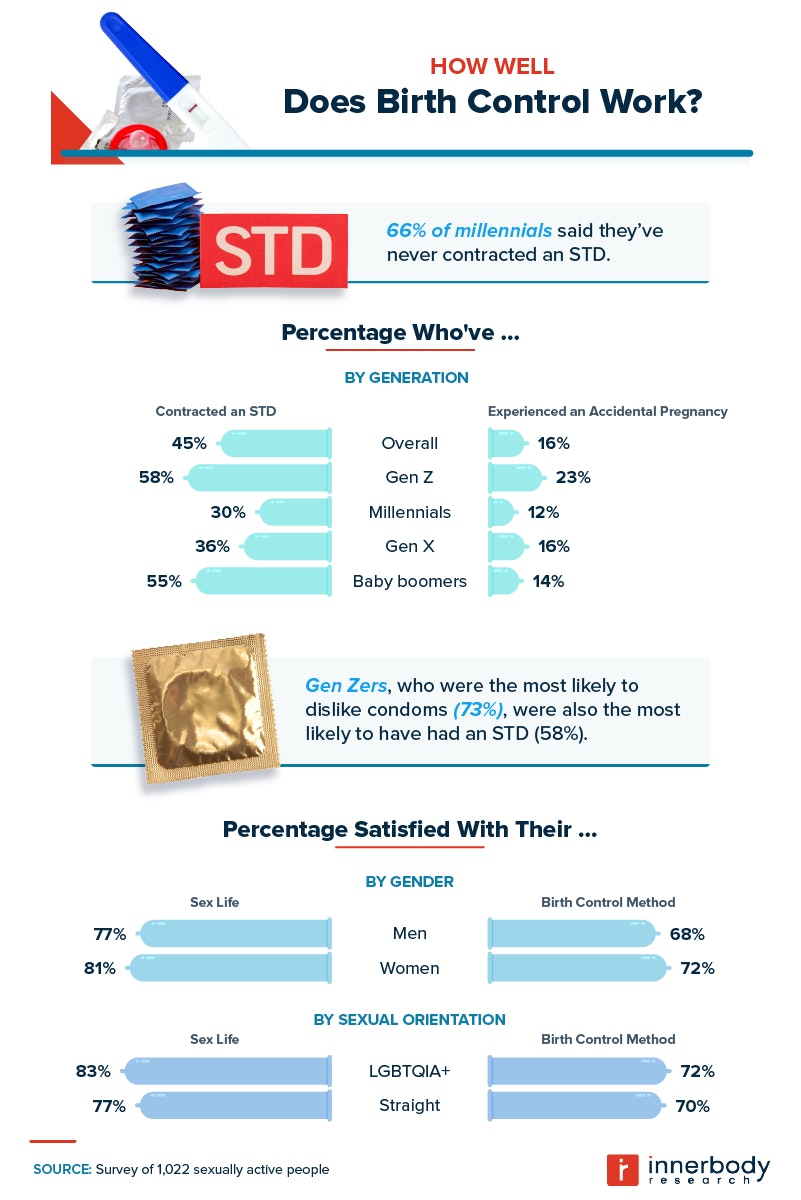
Photo by Innerbody Research
Gen Z reported practicing safe sex. No matter what protection was used, Gen Z was fairly satisfied with their sex life and chosen birth control methods.
By gender, women were more satisfied than men in both areas. By sexual orientation, the LGBTQIA+ community showed a higher satisfaction rate for both sex and birth control than respondents identifying as straight. Birth control aside, when it came down to it, Gen Z may not be having sex as often, but when they do, they claim a higher satisfaction than any other generation.
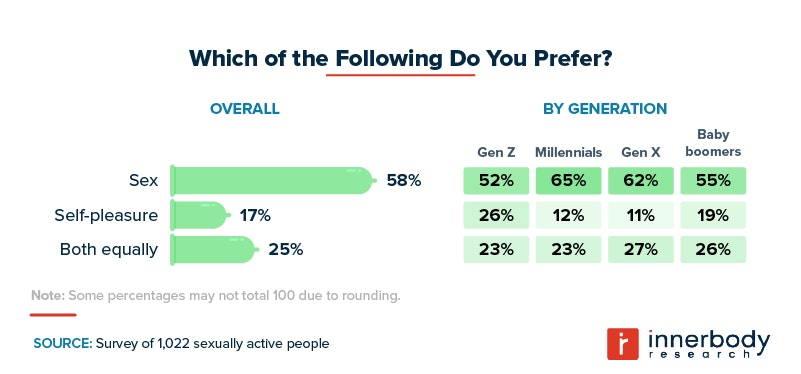
Photo by Innerbody Research
With all this satisfaction talk, which sexual method satisfies people most — sex with a partner or self-pleasure? More than 1 in 4 Gen Zers preferred masturbation to sex, and it might be because they’re stuck on their screens.
According to a recent study, Gen Z is highly likely to watch porn at bedtime (86%), and the vast majority (nearly 73%) reported masturbating prior to sleeping. That’s quite a bit higher than previous generations, including millennials. Does masturbation prove that Gen Z lacks interest in sex? Not necessarily — they may just have other outlets.
Being responsible with your partner
Gone are the days of women being solely responsible for birth control. More than half of men from each generation said they would be willing to take a birth control pill designed for men, with Gen Z leading the pack (81%), yet only 52% of the women surveyed said they’d ask their partner to do so.
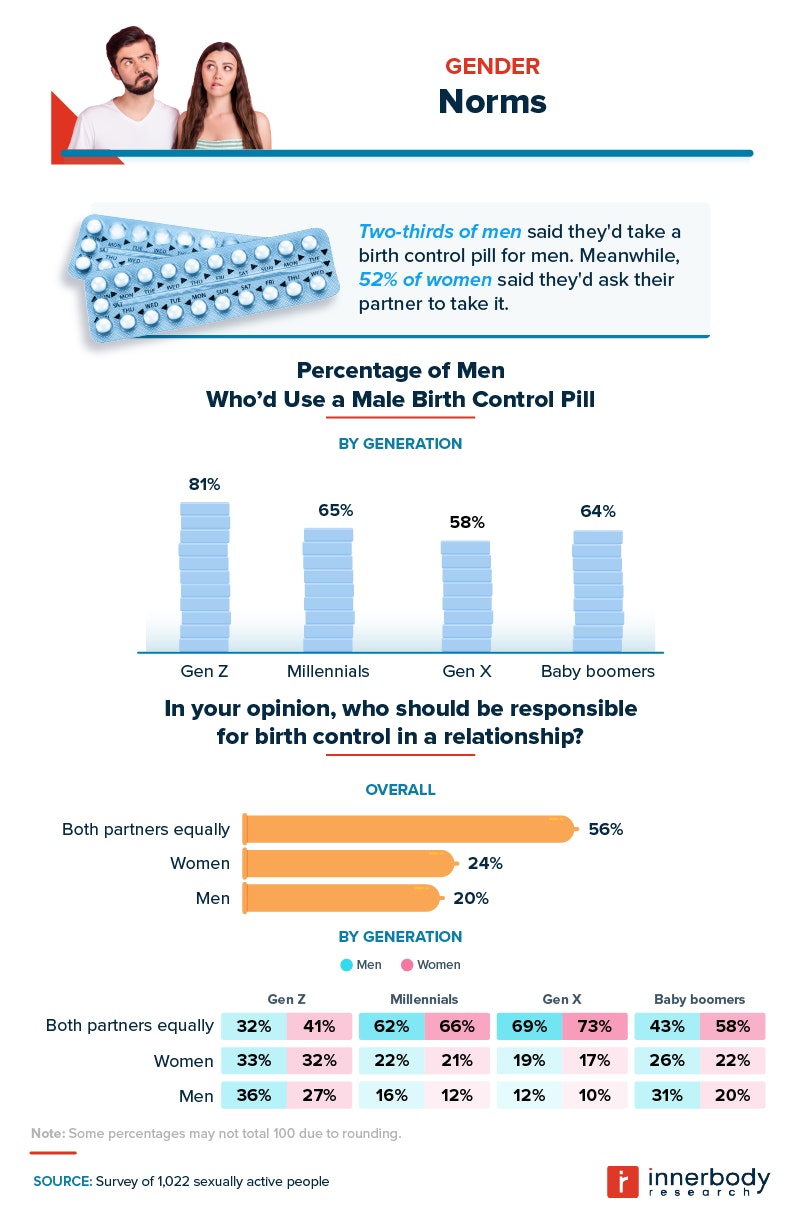
Photo by Innerbody Research
Gen Z men were impressive with their willingness to take oral contraception. They ranked much higher than millennials (65%), Gen X (58%), and baby boomers (64%) for willingness. It’s good to see a generation of men willing to share the responsibility, though perhaps not entirely surprising since many of their peers — Gen Z women — are vocal feminists.
From a cultural standpoint, Gen Z women worldwide often embrace feminism and see the power of activism. Those active voices register with the men of Gen Z as well. Young women are standing up for themselves, including in areas such as birth control, and perhaps young men are hearing their message and seeing them as equals.
Source is key
What kind of birth control is available, and do all generations know what’s available and how to get it? More than likely, a Gen Zer isn’t going to get their information from the same place a baby boomer will find it.
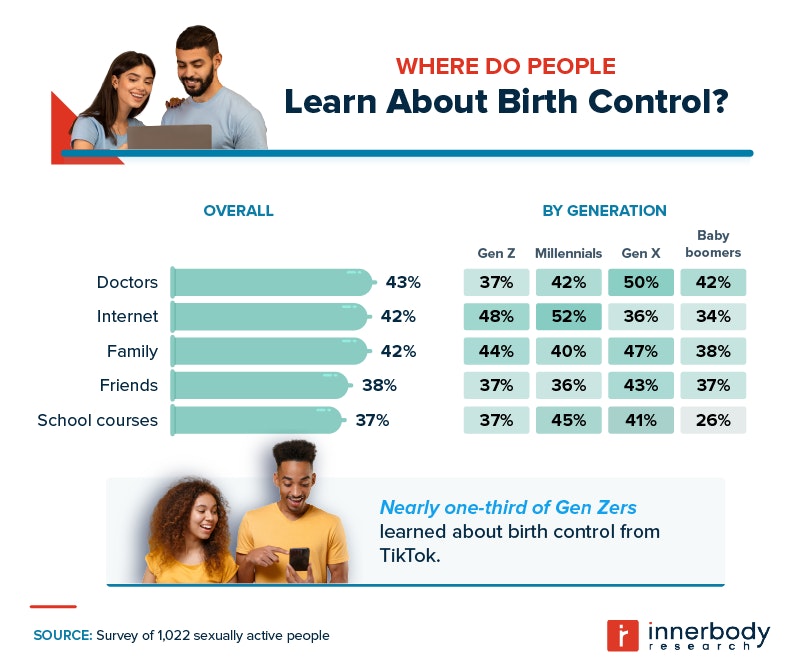
Photo by Innerbody Research
As a matter of fact, nearly one-third of Gen Zers said they learned about birth control on TikTok. Tell that to a boomer, and they might be shocked. Rightfully so, since TikTok wasn’t around when they were young. Still, for many of today’s young people, TikTok is an important part of their life, and if they can somehow learn to practice safer sex because of it, that’s a good thing.
The five main sources of birth control education for most respondents were:
- Doctors (43%)
- The internet (42%)
- Family (42%)
- Friends (38%)
- School (37%)
For Gen Z and millennials, the internet ranked as their top source for such information.
Safer sex in 2022?
Gen Zers are a clearly thoughtful generation, considering alternatives to casual sex and understanding that the responsibility of sex falls on both parties involved. Though they may sometimes face information overload, and previous generations may not fully understand why Gen Zers don’t desire to date more, every generation is different. Gen Zers are doing their thing … just not doing it as often.
How’s your sex life? Do you relate to Gen Z, or are you of a completely different school of thought? Our goal at Innerbody is to stir up discussions and offer thought-provoking topics. We strive to provide helpful and accurate information about health topics, so our readers can find the answers they’re looking for. If you have any questions or are looking for a particular topic, please feel free to contact us today, and we’ll help however we can.
Methodology and limitations
For this campaign, we surveyed 1,022 people who had been sexually active in the past 12 months. 51% of them were men, and 49% were women. Among them, 25% represented each generation.
For short, open-ended questions, outliers were removed.
To help ensure that all respondents took our survey seriously, they were required to identify and correctly answer an attention-check question. Survey data has certain limitations related to self-reporting.
Margin of error: plus or minus 3% with a 95% confidence interval.
Fair use statement
If you enjoyed our discussion about sex lives among the generations, feel free to publish our findings for noncommercial purposes. We only ask you to please be sure to link back to this page to provide proper credit.


